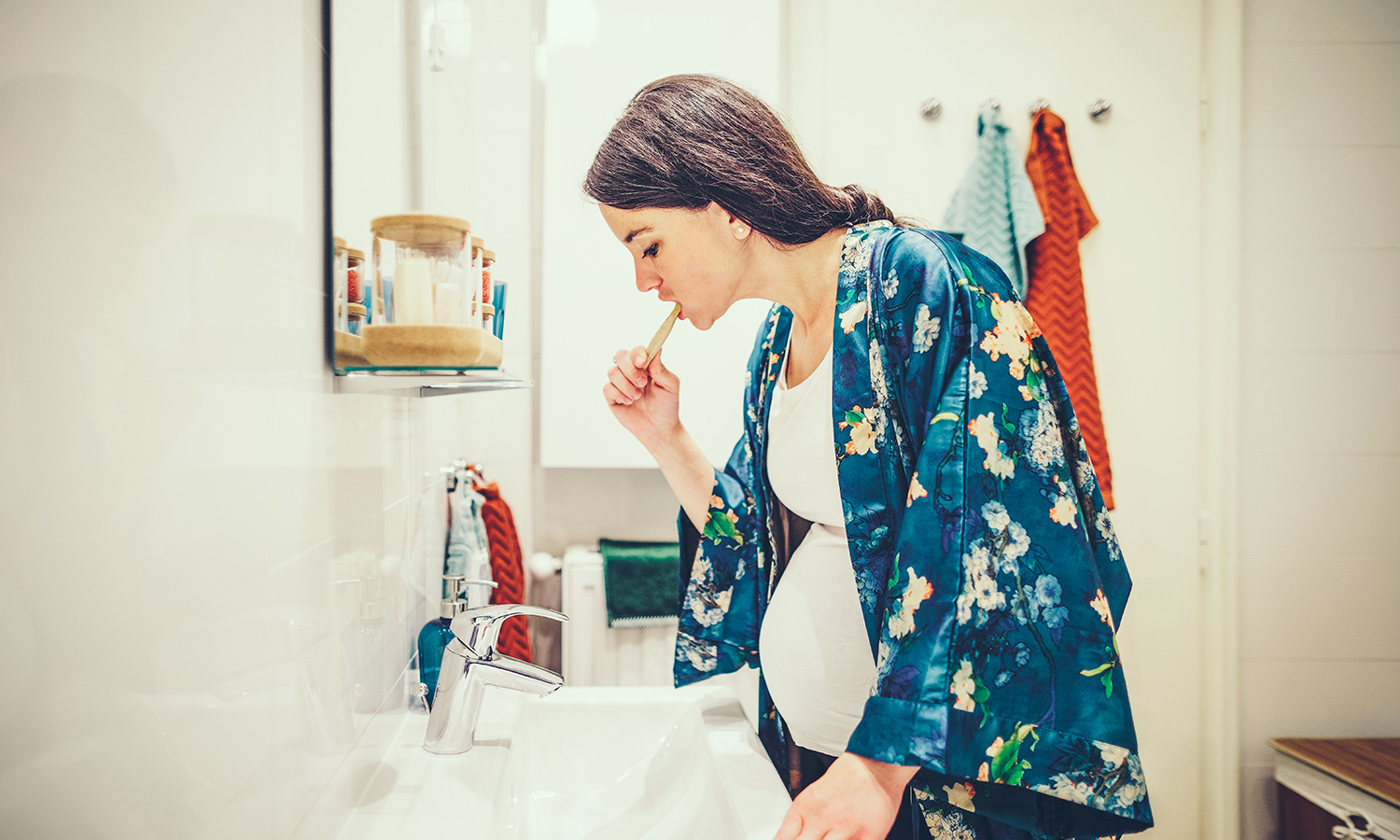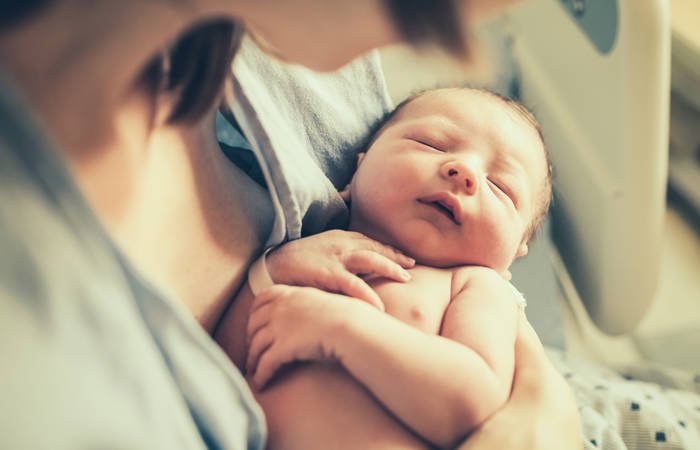Like what you see?
Sign up to receive more free parenting advice.
Thank you for subscribing to our newsletter!
Child Development

Credit: iStock.com/Eva-Katalin
Pregnant women who experience anxiety or depression are reporting their children are three times more likely to have respiratory infections, colds, fevers and ear infections in the first few years of life, research shows.
While the research is not intended to strike fear, it does highlight the importance of not dismissing the signs of anxiety and depression, but to seeking help early.
Dr Nicole Highet, Founder and Executive Director of Centre for Perinatal Excellence (COPE) says, “pregnancy and the first year following the birth of a baby is the time in a woman’s life when she is most likely to develop a mental health problem and unfortunately the early signs of these conditions are just put down to the pressures of having a baby”.
“People often hold high expectations about having a baby, so they often don’t get help as they feel they should be able to cope.”
Research from the Australian National University (ANU) and Pennsylvania State University studied the cortisol, or stress hormone, levels in pregnant women and its impact on the child’s health.
“We found that mothers with higher depressive symptoms reported poorer child health,” says research author Dr Michael Roettger, Lecturer in Demography at ANU.
“In addition to our published findings for depressive symptoms, we also found a similar relationship between anxiety symptoms and poorer child health.”
“That is fairly consistent with the broader research in the field, that prenatal stress and depression can impact the development of the foetus and a range of outcomes later in childhood and adulthood.”
What is antenatal anxiety and depression?
Dr Highet explains that it is natural for pregnancy to be a time of increased stress, as many changes occur.
However, the difference between stress and conditions like anxiety and depression is that stress is a response to a particular event or stressor (like an exam, public speaking), when the stressful event has passed (in other words the adverse stimulus is removed) the stress subsides.
“Anxiety and depression are conditions, which regardless of what is going on around you, continue and are ongoing,” she says.
“Anxiety is very common in pregnancy, one in five pregnant women will experience anxiety and one in five will experience a post-natal anxiety condition.”
“The main factor that places someone at greater risk of antenatal anxiety or depression is if they have experienced them in the past or have a family history,” says Dr Highet.
“Other factors include having a perfectionist personality, levels of available social support, major life stressors or losses, a history of physical, emotional or sexual abuse, having an emotionally unsupportive mother during your upbringing, experiencing a traumatic birth and the risk of post-traumatic stress disorder from that, and having a baby who is unsettled, whether that is colic or reflux, or not feeding or sleeping.”
Dr Highet highlights that antenatal anxiety and depression are treatable or manageable conditions.
“The earlier we recognise and treat these conditions, the faster the person can recover,” she says.
Anxiety is very common in pregnancy, one in five pregnant women will experience anxiety and one in five will experience a post-natal anxiety condition.Dr Nicole Highet
Stay up to date with the latest news and articles from First Five Years
Thank you for subscribing to our newsletter!
What does the research say?
Researchers measured the cortisol levels of 123 pregnant women between 12 and 32 weeks gestation before and after a discussion with their partners on their relationship issues.
“The aim was to measure how much the women reacted to the discussion in terms of relationship stressors,” says Dr Roettger.
For women who had an unhealthy response to the stressor, or whose cortisol levels remained unchanged, they reported lower child health and a greater number of childhood illnesses.
In fact, their children at the follow up interviews (six months, one year and three years old) were three times more likely to have respiratory infections, colds, fevers and ear infections and their children needed twice the amount of GP visits due to illness.
Dr Roettger explains, “individuals with a history of depression or anxiety tend to be less reactive to stress and this could be because they react to everything”.
“Stress during pregnancy tends to impact the foetus,” he says.
Dr Highet agrees, “we know that experiencing anxiety or depression during pregnancy increases your cortisol and that does cross the placenta and can impair the developing brain of the foetus”.
“This can impact on poor birth outcomes,” she says.
“It can make the child more unsettled or have a difficult temperament.
“It can lead to behavioural difficulties in childhood.
“It’s not only while you’re pregnant, post-natal mental health issues can compromise breastfeeding, it can impair bonding attachment between the mother and infant and delay the child’s cognitive, emotional and behavioural development.”
How to get help.
“If you recognise the symptoms in yourself, the first point of help is getting a mental health care plan from your GP,” Dr Highet recommends.
For those who can’t access a GP or need more immediate help, PANDA also has a national helpline and Beyond Blue has online support services.
COPE also has tools to help.
“We are developing the COPE e-referral directory to help women search for a professional with expertise on perinatal mental health,” says Dr Highet.
“We also have Ready to COPE, which is a free e-mail subscription for parents that focuses on emotional and mental health, from educating you about the signs and symptoms to how to minimise your risk to where to go to for help and what type of help you need.
“Ready to COPE contains many helpful tools and strategies to help you to reduce the impacts of stress and reduce the likelihood and effects of depression and anxiety.
“It’s about empowering parents with information so they can seek help early on.”
The signs and symptoms of antenatal anxiety:
- Worrying thoughts that keep coming into your mind – like worrying that something may be wrong with the baby.
- Panic attacks – these are outbursts of extreme fear and panic that ‘take over your body’ and leave you feeling out of control.
- Constantly feeling restless, ‘on edge’ and irritable.
- Feeling tense in your muscles and tight in your chest.
See more at COPE’s antenatal anxiety fact sheet.
The signs and symptoms on antenatal depression:
- Feeling low or numb – some women describe feeling nothing at all.
- Loss of confidence, feeling helpless, hopeless and worthless.
- Feeling teary and emotional, angry, irritable or resentful towards others.
- Changes in sleep – not being able to sleep even when you have the chance or wanting to sleep all the time.
- Changes in appetite – accompanied by weight loss or weight gain.
- Lack of interest and/or energy.
- Difficulties concentrating, thinking clearly or making decisions (which can also result from lack of sleep).
- Feeling isolated, alone and disconnected from others.
- Having thoughts of harming yourself, your baby and/or other children
- Finding it difficult to cope and get through the day.
See more at COPE’s antenatal depression fact sheet.






